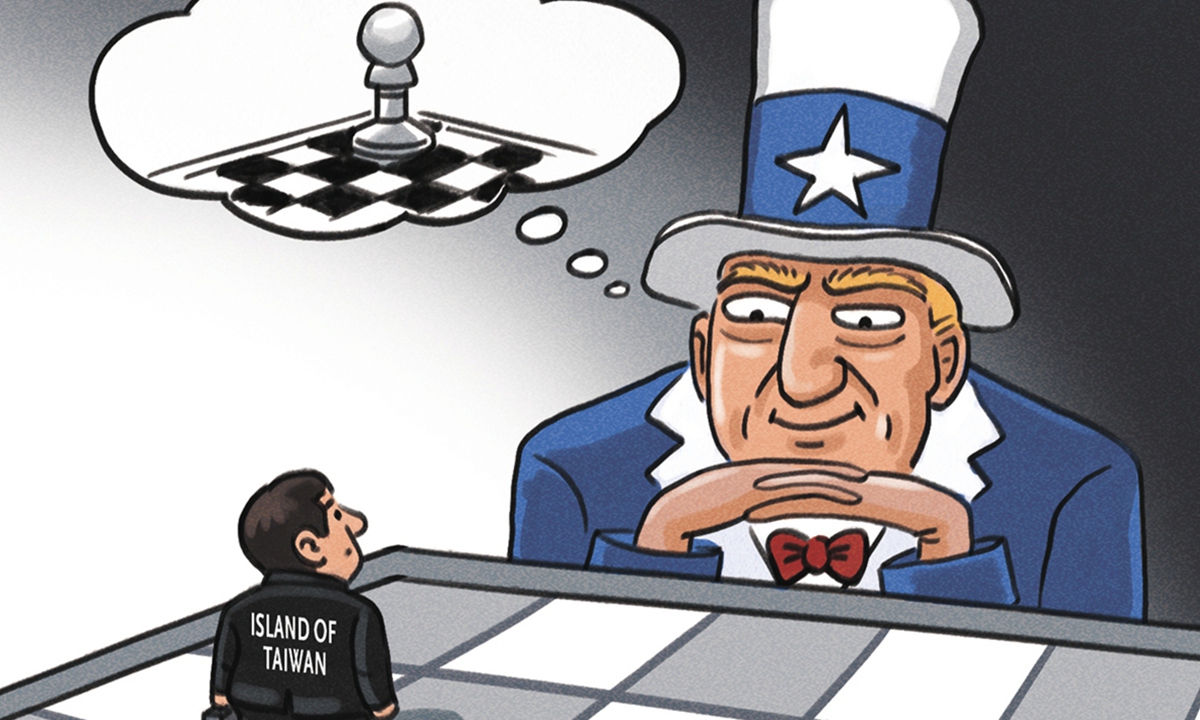Washington unlikely to change Taiwan ‘strategic ambiguity’ to enrage Beijing
By Yuan Zheng Source: Global Times Published: 2020/10/12 20:03:40

Illustration: Liu Rui/GT
US national security adviser Robert O'Brien on Wednesday said that "there's also a lot of ambiguity about what the US would do in response to an attack by China on Taiwan," according to Reuters. O'Brien was responding to a question about what options the US would have if the Chinese mainland resorts to force to reunite the island of Taiwan
What O'Brien referred to is a long-standing US policy of "strategic ambiguity" regarding the US military's support for the island.
Some media outlets and US political elite have recently hyped up the idea that Washington should shift away from being ambiguous to being clear and open about Taiwan.
As a matter of fact, it will be difficult for Washington to achieve this sort of shift. Since the 1996 Taiwan Straits crisis, many US political elites have discussed the subject. Some of them argue that the US needs to clarify its policy on the island of Taiwan. But no consensus has yet been reached on this matter of clarity in the US.
The US has been playing the island as a card as a tactic to deal with the Chinese mainland. If the US clearly states how to defend the island of Taiwan in case of an attack, it will restrain Washington's flexibility to cope with the Taiwan question. If the commitments are far from being "sufficient," both the island and some of US' allies will be disappointed. Washington will be labeled as being soft on China. Furthermore, if the US makes detailed and definite commitments, it will directly challenge its one-China principle. This will jeopardize China-US relations. The Chinese mainland will firmly protect its sovereignty and territorial integrity no matter what the costs.
The separatist forces in Taiwan are becoming increasingly rampant. The authorities of Taiwan regional leader Tsai Ing-wen have spared no effort to show its stance of anti-Chinese mainland sentiments. They applaud pro-US positions, hoping Washington will lend it a hand to finally achieve full secession. If the US clarifies its strategy, and makes dedicated commitments to defend the island, Taiwan separatists will be emboldened to officially pursue secession. This will put the US into an unfavorable condition, which the US is reluctant to see.
In terms of the Chinese mainland, the Taiwan question concerns its core national interests. If the US crosses China's red-line over this question, Beijing would sever its diplomatic ties with the Washington. There is no doubt that Washington is clearly aware of the importance of the Chinese mainland. It will not take risks to break its ties with the Chinese mainland due to Taiwan, because the price is too high.
Therefore, shifting to "strategic clarity" will be disadvantageous to the US. Hence, it will be hard to achieve. In fact, Washington intends to maintain the status quo, and keeps playing the trick. This seems to be the most favorable US position.
As the Chinese mainland's comprehensive national strength continues to rise, the US labels China as its top rival. This makes the island of Taiwan a decent card for the US to play in order to contain the Chinese mainland's development. Therefore, Washington will no doubt continue to manipulate the Taiwan question.
Recently, the Taiwan card has been played with increasing ferocity. US secretary of Health and Human Services Secretary and undersecretary of State visited the island successively. The US has reinforced its military cooperation and increased arms sales to the island too. The US seems to be attempting to make its relations with Taiwan more "official." However, in order to avoid provoking the Chinese mainland and for its own interests, it does not seek to officially establish diplomatic relations with Taiwan.
The US general election is approaching. No matter who will win the coming presidential election, the US' Taiwan policy will maintain consistent There will be no essential difference. Yet Republicans and Democrats have different focuses. The Democratic Party will be more cautious. It emphasizes the role of Taiwan as a "democracy paradigm" in "guiding" the development of Chinese mainland. Therefore, the Democratic Party may consider not to overly complicating the Taiwan Straits situation.
On the other hand, the Republican Party underlines practical interests, geopolitics, and containing the development of the Chinese mainland. There are some pro-Taiwan forces in Republican Party. Therefore, The Republican's practice seems to be more radical.
The author is Deputy Director and senior fellow of the Institute of American Studies, Chinese Academy of Social Sciences. opinion@globaltimes.com.cn
Posted in: VIEWPOINT